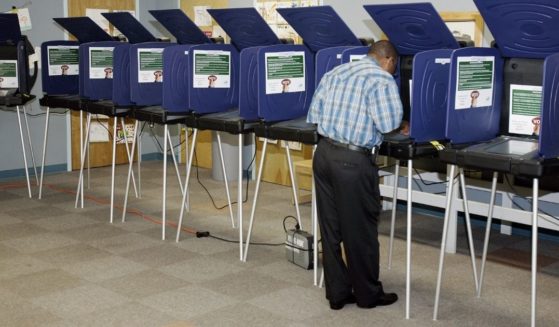
All 77 voting precincts in Fayette County, Pennsylvania, reported issues with ballots being rejected when voters attempted to perform their civic duty on Tuesday.
“I’m a Republican. I went to scan a ballot and it spit it out. I tried three or four times and it kept spitting it out,” resident Lorie Lambie told KDKA-TV after a voting machine rejected her ballot during Tuesday’s primary election.
Jeff Valek, another resident whose ballot was rejected at a nearby precinct, said, “Just went through the normal process. I took it over to the machine and it was rejected.”
Though Lambie’s testimony might call others to believe the majority of ballots that were rejected belonged to Republican voters, Fayette County Commissioner Scott Dunn assured reporters that the mistake wasn’t partisan.
“I can tell you both Republican and Democratic ballots are affected by this,” he said, adding that the issue with rejected ballots pertains to a barcode flaw instead of a flaw with the machines. “We’ve been in contact with all 77 precincts. And for the larger Republican precincts, we are trying to reprint ballots.”
KDKA reported that courts have authorized an emergency petition, allowing the judge of elections at each precinct to hand count ballots that were rejected by machines.
Still, distrust in the voting process remains — especially after the controversy surrounding the 2020 presidential election.
When interviewed, Lambie noted her skepticism about why her ballot was rejected, saying, “I think [it’s] suspicious after everything that happened with the presidential election.”
Lambie’s experience proves ballot rejection isn’t doing anything to help the image of election integrity and the issue needs to be resolved as soon as possible.
What would any of us think if we went to the polls and cast a ballot, only to have that ballot rejected by a machine? Perhaps this would raise further suspicions about inaccurate vote counts, rigged machines or other election interferences. We cannot say whether this issue was intentional — or partisan — but this does speak volumes about flaws in the process.
Though the issue allegedly pertains to barcode problems in this instance, what can be said about issues Americans in other states had during previous election cycles?
Georgia, for instance, experienced problems with its voting machines during June of 2020, when new systems were rolled out and polling stations were ill-equipped to troubleshoot issues that arose.
Michigan has dealt with its own troubles that arose from ballot machines as well, as evidenced when one state attorney and a team of experts were reportedly able to manipulate the voting software to flip Republican votes to Democratic ones — proving that higher safety measures were needed.
So what does this say about the integrity — or lack thereof — we can expect from the voting systems in place?
Many voters fear machine glitches or human election interference. They fear their ballot may be disregarded or handled improperly by poll workers.
Though some of these fears may be rooted in personal skepticism, evidence of previous election integrity issues remain.
Unless the flow and easiness of our election process changes soon, many Americans’ faith in election integrity will not be restored.


